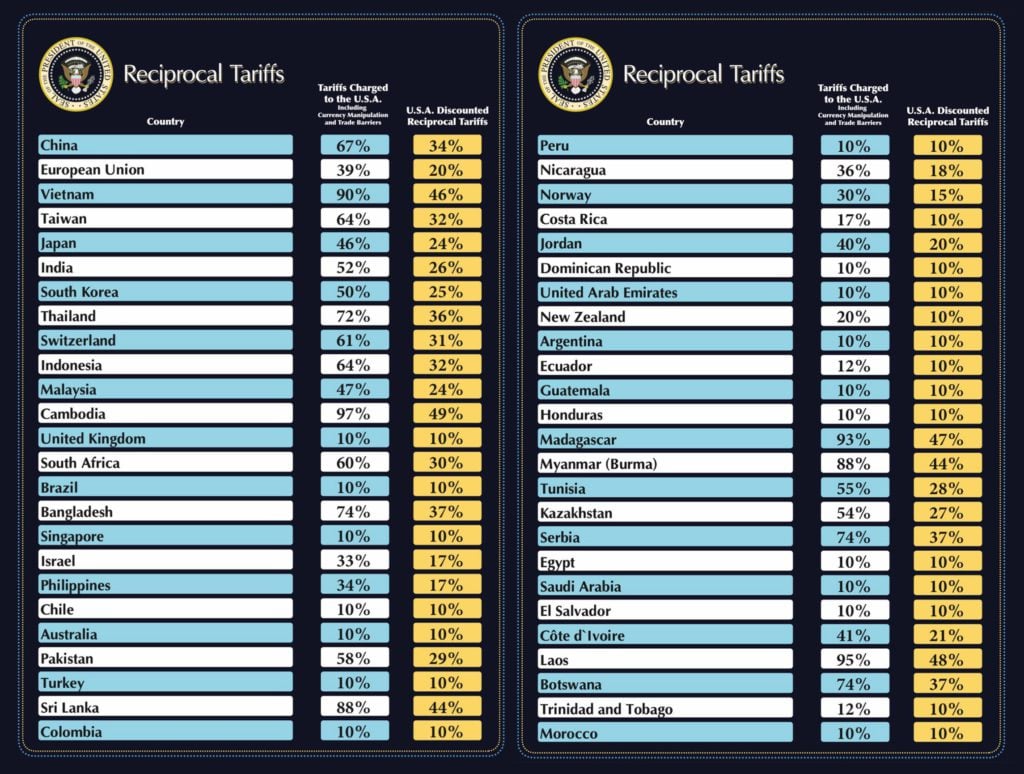U.S. President Trump this morning, after the U.S. stock market closed, as expected, announced the latest tariff policy, declaring a 10% baseline tariff on global trade partners, and imposing higher "reciprocal tariffs" on specific trade partners. China was the first to be named (34%), with Taiwan (32%) and Vietnam (46%) also being key focus areas.
As this was much more aggressive than the market had previously expected, it led to a collective plunge in U.S. stocks after hours and the cryptocurrency market...

Treasury Secretary Bessent: There Will Definitely Be Negotiations
According to White House senior officials, the 10% baseline tariff will take effect at 4:00 AM on April 5th, with reciprocal tariffs set to be implemented on April 9th, but there seems to be room for change.
After Trump's announcement of reciprocal tariffs, U.S. Treasury Secretary Scott Bessent stated in an interview that he hopes trade partners will not retaliate, otherwise the situation will escalate, and he previewed that negotiations will definitely occur:
My advice to all countries now is not to retaliate, because if retaliation occurs, the situation will escalate. If there is no retaliation, the current tariff rate will be the highest.
There will definitely be negotiations. Let's wait and see.
Trump Using Tariffs as Negotiation Chips Again?
Trump's consistent policy has been to leave room for negotiation when introducing new tariffs, just as he repeatedly delayed tariffs on Canada and Mexico in early February. His purpose is to use tariffs as negotiation chips. CNN had previously quoted expert opinions commenting:
Trump first makes outrageous statements, then withdraws them. The outside world will worry about the worst-case scenario, and then realize this is all part of Trump's art of the deal.
Always barking, but never really biting.
What Are the Reactions of Various Countries?
Regarding Trump's latest tariff measures, compiled from Reuters and other international media reports, here are the responses from major U.S. trade partners:
- Canadian Prime Minister: Will fight against U.S. tariffs. In fact, this latest tariff policy does not have additional impact on Canada and Mexico, as Trump had previously announced 25% tariffs on these two countries. However, the Canadian Prime Minister responded today that Trump's tariffs will completely change global trade, and tariffs on steel, aluminum, and automobiles will directly affect millions of Canadians. Canada will take countermeasures.
- Mexican President: Unwilling to escalate the situation. Mexico's stance is moderate. President Claudia Sheinbaum stated today that they will respond to tariffs by revitalizing the economy and will not retaliate against the U.S.
- Australian Prime Minister: Will not retaliate against the U.S. As Trump's close ally, the Australian Prime Minister criticized Trump's 10% tariff on Australia today as not very friendly, but also stated they will not retaliate.
- United Kingdom: Committed to reaching an agreement. UK Secretary of State for Business Jonathan Reynolds responded today that the UK will work to reach an agreement with the U.S. to mitigate the impact of the 10% tariffs.
Finally, BlockTempo reminds investors that although the U.S. currently leaves room for negotiations, and many countries have expressed unwillingness to escalate the tariff war, the specific negotiation results remain to be seen. The capital market will obviously be affected by Trump's tariffs in the near term, and investors should pay attention to market fluctuations.








